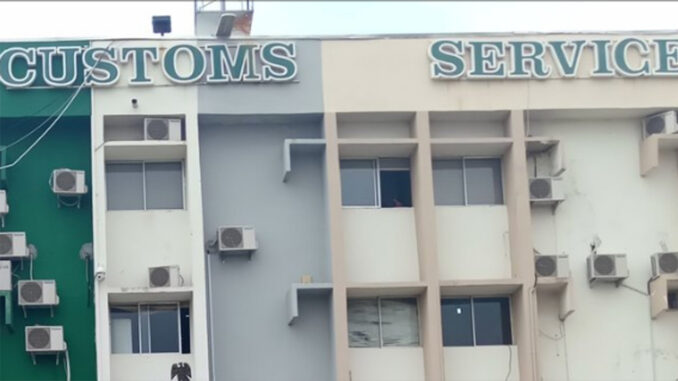
The Customs and Excise Department, no doubt is significant in implementing the government’s export and import policies; and thereby generating revenue for the Federal Government. That task is onerous and should not be underestimated. But there ought to be ways of discharging that function efficiently and more decently than the department currently exhibits.
Customs officials are getting increasingly unpopular on account of their excesses seen in their now regular roadblocks in cities and the hinterland purportedly checking vehicle particulars. In the process, they cause hardship to motorists and disrupt traffic flow unduly. The practice has also occasioned allegations of extortion. This neither makes for efficiency nor is it in tandem with international best practice.
Reports are rife that the excesses of the customs are becoming unbearable. Some innocent travelling motorists, sometimes with their families, are stopped at ad-hoc customs roadblocks, arrested and subjected to undue delays and discomfort in the middle of highways. There are subsequent allegations of extortion and bribery before the victims are released. In some cases, vehicles are impounded, thereby leaving travellers in disarray. Besides, it is now common for custom officials to raid markets and impound bags of rice on the ground of having been smuggled or imported without due process.
The Custom’s repugnant conduct was boosted in 2017 when the incumbent Customs Comptroller General (CG), Colonel Hameed Ali (rtd), ordered vehicle owners to cross-check their customs papers or risk having their vehicle impounded. The directive appeared to have been motivated by a whopping N1.1 trillion target the department set for itself, oblivious of the precarious economic situation in the country.
In 2016, the customs set a target of N1 trillion, which it did not meet. It generated N898 billion as revenue, including Value Added Tax (VAT), leaving a shortfall of N102 billion. Today, the situation is worse due to economic depression. Many shipping companies have closed shop in Nigeria owing to a drastic reduction in imports arising from foreign exchange scarcity and naira devaluation. Government had banned the importation of vehicles and rice through the land borders. All these have led to a sharp reduction in the revenue accruable to the customs, while smuggling thrives.
But rather than face the reality, the customs’ pre-occupation is apparently on how to meet the huge revenue target, even if it means adopting unconventional measures. And that has been manifested in its mounting hundreds of roadblocks on major highways and also ransacking markets looking for rice. The customs’ emphasis has shifted from its core duty of preventing the influx of contrabands and dangerous, illegal items, to revenue collection, at the expense of Nigerians.
Following Colonel Ali’s directive, the department had, with effect from April 13, 2017, been impounding vehicles whose duties have not been paid or paid in full. It is instructive that the Senate directed the customs to suspend the implementation of the new policy, pending Col. Ali’s appearance before the lawmakers to explain the reason behind the directive. Stakeholders in the maritime sector also expressed dismay and disapproval of the customs declaration. But the department, in a sharp reaction, insisted that there was no going back and that the policy must take off as scheduled. The reaction, by disregarding the country’s parliament has hardly enhanced the image of Customs.
The customs is not, and should not be seen to be working for itself but in the interest of the country. As such, its conduct should be in the public interest, Not only should it adhere to its own enabling laws, it should carry out its functions in cognizance of the country’s economic realities. Whereas Section 8 of the Customs and Excise Management Act undoubtedly confers powers, authorities and privileges to the customs in the performance of its duties, those powers should be exercised within the ambit of the law. The customs are not empowered to act ultra vires
The customs must, at all times, act with a high sense of responsibility and not constitute gangsterism against hapless citizens. Use of excessive force should be avoided. In carrying out its duties, the customs should respect the rights of the people, be temperate and have respect for the human person. Only then can the officials expect the citizens to cooperate with it, in accordance with the law.
While the department’s powers to conduct searches at homes, premises or warehouses are not disputed, the department should concentrate on the borders where the contrabands or illegally imported items pass through. The department should make use of technology and modern gadgets to carry out that job where the collateral damages are minimal. By the time they wait until the items get to the consumers, or the last party in the supply or import chain, it will be impossible to safeguard the people’s rights and interests, more so with the open nature of markets in the country.
Not long ago, there was outrage when customs men mounted roadblocks and seized several bags of rice of travellers going home for Christmas, prompting an outcry by former governor of Anambra State, Peter Obi. Similarly, the customs officials’ conduct at Kayero market in Sango Otta, Ogun State which they invaded searching for smuggled rice left a lot to be desired because the victims were not the smugglers but women traders punished for not having custom papers for the rice. It is ridiculous that smugglers outsmart the customs at the borders and the aggression is transferred to the public.
The customs have a duty to checkmate smugglers and as much as possible prevent the inflow of smuggled goods that evade duty payment. But they should mount surveillance at ports, border posts, including seaports, airports and other frontiers, where officials check incoming and outgoing goods. Going about in their current brash manner is a discredit to their name and an invitation to bribery and corruption, apart from endangering the safety of law-abiding citizens.
END

Be the first to comment